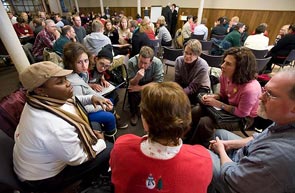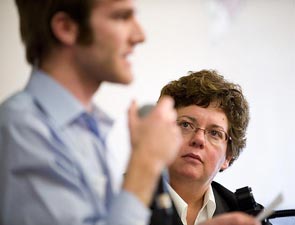More than 150 students, faculty and staff filled every corner of the Red Gym’s On Wisconsin Room on Tuesday for a spirited lunch-hour discussion.
“Many, many minds are better than one or two or three on this topic,” said Chancellor Carolyn “Biddy” Martin. She initiated the forums to gather creative input on how to work smarter and more efficiently during a period of serious economic hardship.
A first suggestion came from UW-Madison senior Jared Forney, organizer of a Wisconsin Public Interest Research Group (WISPIRG) campaign to lower textbook costs for state students. “The rising costs of textbooks is something every student feels,” he said, and he encouraged university leaders to seek more open-source and online-access learning materials that can reduce the burden.
“I agree that the textbook issue is really a critical one,” Martin said, noting that the UW System Board of Regents is asking campuses to pursue more cost-saving ideas on textbooks.
Martin went on to emphasize that college affordability, in the broadest sense, is a top priority for the institution’s future. While the university cannot “economically or ethically” justify freezing tuition at current levels, Martin said UW-Madison must do more to attain greater financial aid support for students who need it most.

Participants break into small groups to brainstorm the challenges and opportunities facing the unviersity.

Chancellor Martin listens as a participant shares the highlights from one of the brainstorming sessions.

2:01 p.m.
Because of the economic situation, I’m watching many folks decide to retire earlier than they anticipated. They are intelligent, capable, and energetic individuals with a strong connection to the University. Both individually and collectively they are a resource the University could tap into. Their services could be used to staff some of the functions that are critical but are hard to fund. Perhaps, the University could trade enrollment in classes for time spent mentoring “at risk students” or running “leadership programs” or “fund raising activities” or any number of different activities. Many retirees would like to take University level courses. Trade their time for the cost of tuition.
The University’s retirement community will continue to grow. Define ways people can transition from the “daily grind” to opportunities to contribute to the UW.